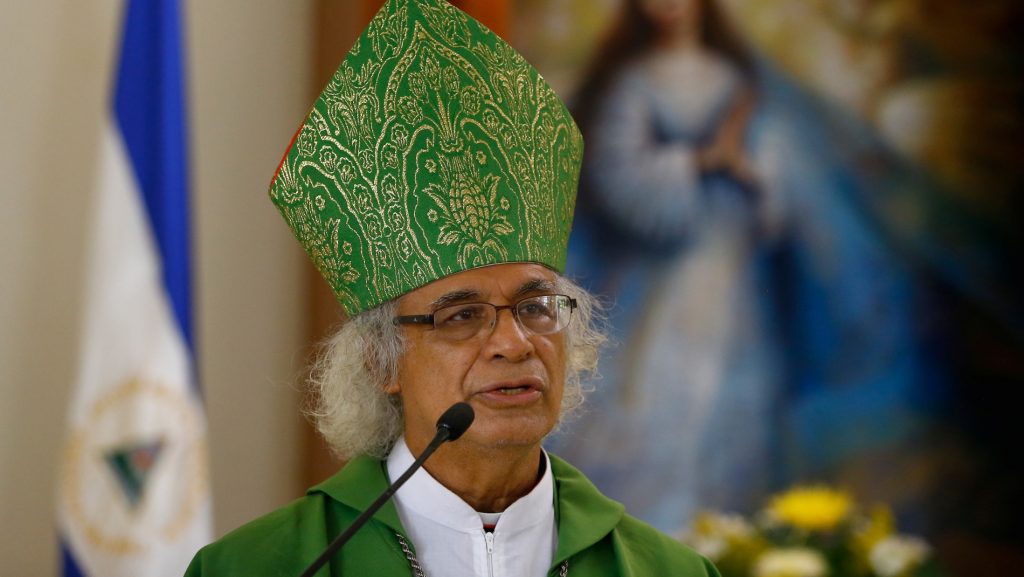After almost four months away from the public eye, Nicaraguan Cardinal Leopoldo Brenes celebrated Sunday Mass in his archdiocese’s cathedral. He had been hospitalized with COVID-19, and then recovered at home.
The last public appearance by the archbishop of Managua had been on July 31, when he said Mass commemorating the one-year anniversary of the arson attack against a historic crucifix known as the Blood of Christ.
Speaking two weeks after President Daniel Ortega was reelected, the prelate said that priests and religious cannot remain silent, in a country where the clergy has been persecuted for their criticism of the government.
“Pray for me, pray for our priests, so that we may be promoters of his [Jesus Christ’s] kingdom, Brenes said. “The apostles said it well: We cannot be silent about what we have seen and what we have heard.”
“Therefore my exhortation, that we not tire, even in the midst of darkness and in the midst of tensions, to announce this kingdom, a kingdom out of the ordinary, the kingdom of Jesus Christ, which has its basis in the heart and which bears fruit,” stressed the cardinal in his Sunday homily.
“The reign of Christ grows every day because it has its base in the heart, like that little mustard seed that grows or like a tiny grain of wheat that deposited in the ground becomes an ear,” he said, noting that the “Magna Carta of that kingdom is Jesus, is love.”
The cardinal also hinted at the fact that he’s not yet fully recovered from COVID-19 by pointing out that by “medical instructions I had to keep the respective rest, to advance little by little but I could not miss this date so important for all of us,” referring to the presentation of Father Said Ruiz Fajardo as the new rector of the Metropolitan Cathedral of the Immaculate Conception of Mary.
Ortega was reelected for a third consecutive term – but the fourth overall, after ruling in the 1980’s – on Nov. 7, after presidential elections that were deemed as “illegitimate” by most within the international community, including the United States, the European Union and the Organization of American States.
Eleven days later, when the Nicaraguan bishops had to elect a new conference president, Brenes stepped aside, arguing that the president of the conference cannot be elected for a third term.
The relationship between Church and State has been particularly tense in Nicaragua since April 2018, when a civil uprising saw the Catholic hierarchy opening the doors of churches so that the protesters could find refuge from the police, military and pro-government militias that used bullets – and tanks – to dispel the demonstrations.
According to the Inter-American Commission on Human Rights, at least 355 people were killed during the protests.
In July of that year Ortega accused the bishops of staging a coup against him, and since then Catholic churches have been attacked, including the Managua cathedral in 2020. Despite several witnesses testifying that a man had gone into the cathedral with a Molotov cocktail and shouted “I come for the Blood of Christ,” the police declared it an accident, the product of a votive candle.
Brenes’s call for priests to continue speaking up came only days after the president downgraded the Vatican’s diplomatic presence in Nicaragua. In many countries where Catholicism is the dominant religion, the apostolic nuncio serves as dean of the diplomatic corps by virtue of his office, regardless of seniority. The Vienna Convention on Diplomatic Relations provided that any country may choose to give nuncios a different precedence than other ambassadors.
However, through a presidential decree published on Thursday, Ortega eliminated the position of Dean of the Diplomatic Corps held by Polish Archbishop Waldemar Stanislaw Sommertag.
Bishop Silvio Báez, the auxiliary of Managua who’s been in exile in Miami since 2019 following a series of death threats, pointed out during his Sunday homily that “the kingdom of Jesus is not violent nor is it imposed with violence, because nothing violent is eternal.”
“The kingdom of Jesus is eternal, those who impose themselves by force are already defeated, those who think they are strong because they are aggressive and humiliate others, the only thing they do is show their weakness, the powerful who take away the freedom of the people and dominate them because they have weapons, exercise an illegitimate power that sooner or later will end,” the prelate said.
Bishop Rolando Alvarez Lagos, of the Diocese of Matagalpa, also took a jab at the government, saying that there are many causes for poverty, but the one in Nicaragua has more to do with political will than anything else.
“There are many things that have impoverished us,” he said. “We are not poor because we are poor, but because there is a political decision of not distributing wealth with equity, subjecting the people to poverty.”

